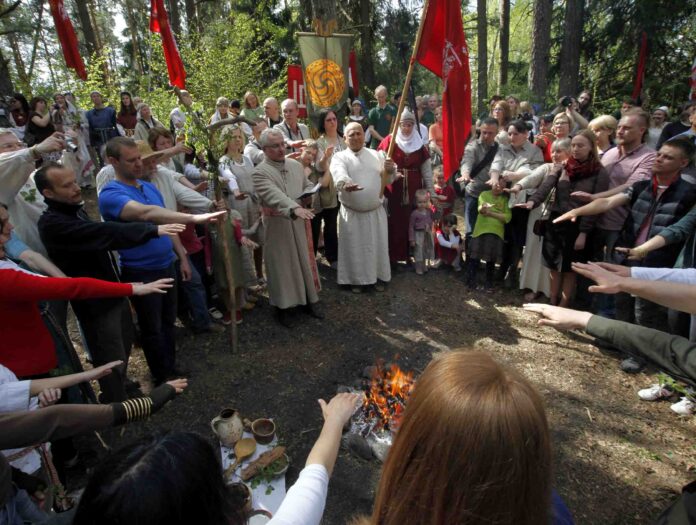
“Romuva” is the name of a neo-pagan community dedicated to restoring Lithuanian paganism. It gained the status of a “non-traditional” religion in 1995, after the Law on Religious Communities and Associations was passed in Lithuania in the same year. Romuvan celebrations take place outdoors near sacred fires and are led by vaidila, while krivis is the leader of the whole community.
On April 27-28 in the lake district of Molėtai, the spring rites called “Jorė” are being organized by the Greens Club “Gojus“, the Molėtai district Museum and Romuva leaders.
One of the most important aspects of the Jorė celebration is the initiation of new members. The rites also include expressing gratitude to the souls of ancestors, and to the life-sources of Perkūnas (Thunder, the common Baltic god of thunder, and the second most important deity in the Baltic pantheon after Dievas), Žemyna (the goddess of the earth) and Gabija (spirit of the fire in Lithuanian mythology, the protector of home and family). Included in the ceremonies are the induction of high priests (vaidilos), the blessing of young members, a ritual battle re-enactment, the offering of rocks and the drinking of a ritual drink. The event includes an artisan marketplace, exhibitions, discussions, lectures and lessons on song, dance, games, and vocabulary practiced by the ancients.
Jorė marks the advent of spring, the awakening of nature after the dark winter and the “greening” of the land. The rituals are meant to reconnect people to nature and the old spiritual traditions of our forefathers.
The event begins with an evening of song and dance around a bomfire. The next day another fire is lit to heat the special celebratory drink. Participants form a procession with flags and emblems toward the nearest hill-fort (a mound left where a castle or fort once stood). There a fire is lit on a traditional altar (aukuras), prayers are said and offerings are made to the forefathers. After the induction of new members, the congregation proceeds to the grove where another altar awaits embers from the fire on the hill-fort. Here, offerings of eggs, gira (a traditional sour drink), bread and salt are presented for the gods, and members congratulate one another and wish each other well for the spring season and the coming year, the return to harmony. Food (traditionally egg dishes) and beverages are shared and games are played with decorated eggs, called “joručiai”. The celebration ends with everyone gathering to watch the sunset.
The Jorė celebration has been held in the Molėtai district since 1997, and attracts participants from all over the country. The festival has also become popular in other areas of Lithuania.



























